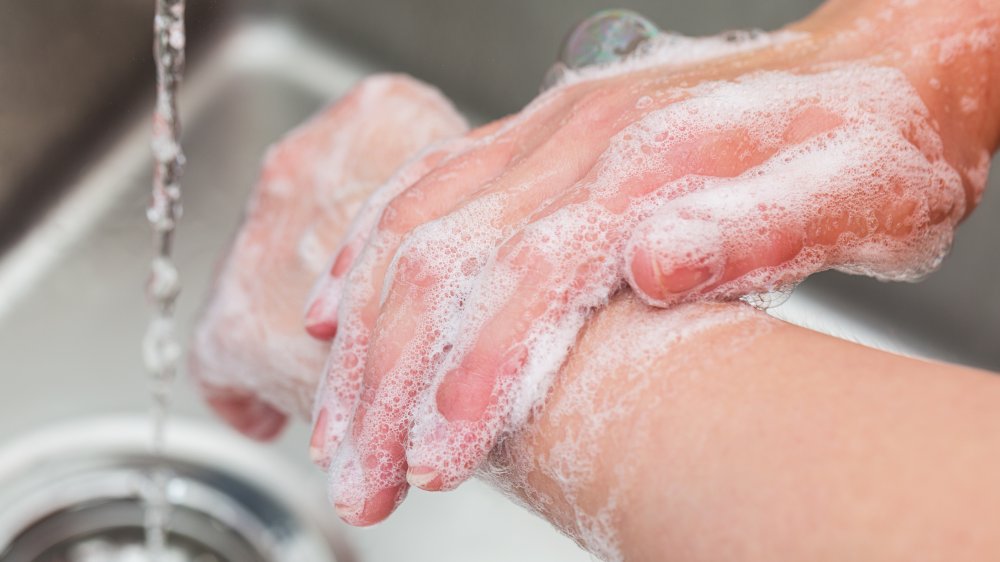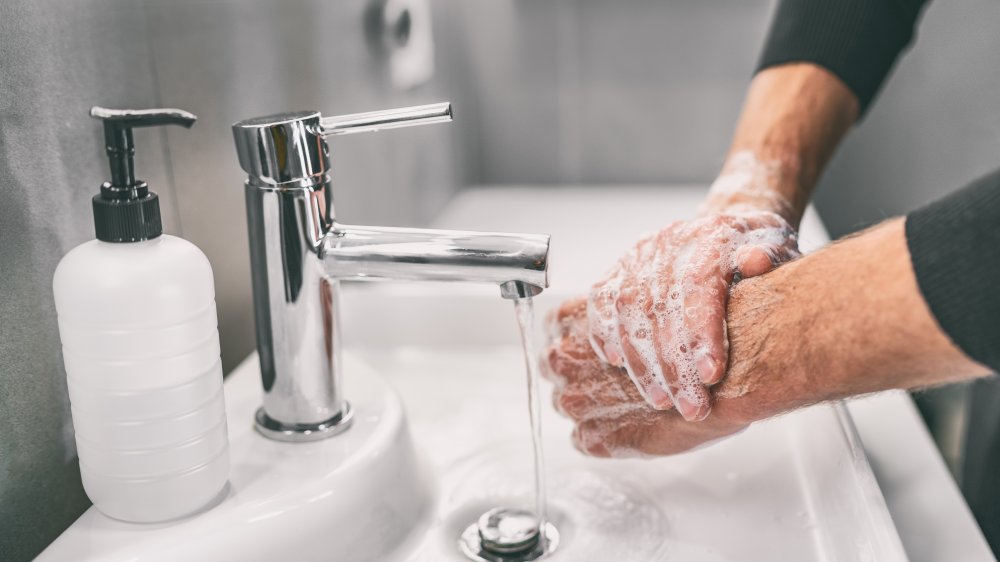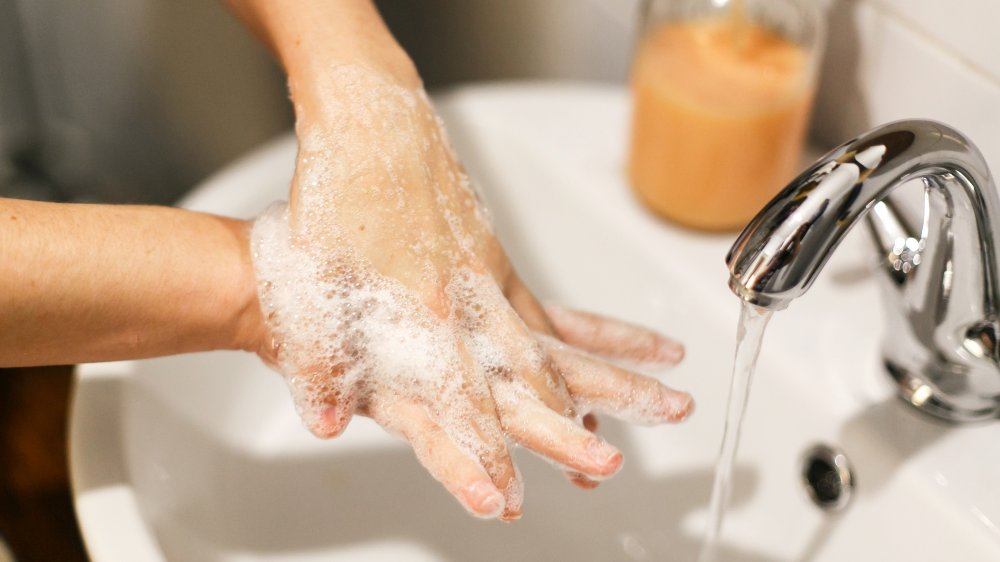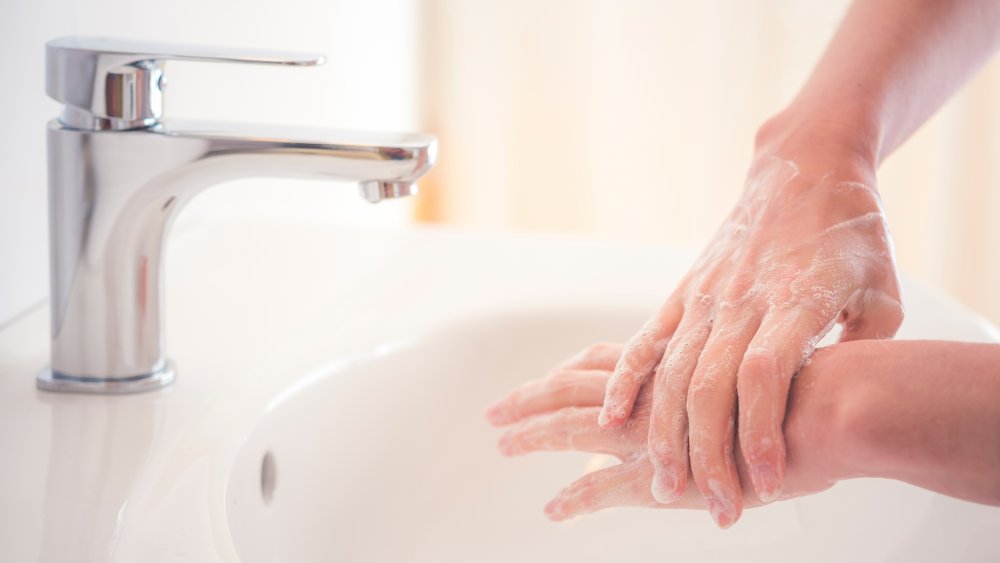The Surprising Truth About Washing Your Hands With Cold Water
Washing your hands with cool or cold water may be more effective than you think. A 2017 study in the Journal of Food Protection found that the temperature of the water was not the biggest factor in killing germs on the hands of volunteers, but instead, there was a stronger effect created by lather time — that means soap, soap, soap. To be noted, this study used antimicrobial soap and tested their experiment for the effectiveness of killing the E. coli bacteria on a small sample of 20 people — although they did test their handwashing techniques 20 times. Interestingly, there was no significant difference between the antimicrobial soap and the regular soap (called bland soap in the research).
This study should not be used to make decisions during the COVID-19 outbreak, as it recommended only 10 seconds of handwashing. The study does, however, seem to back up another 2013 study listed on the CDC website and currently on PubMed, noting that temperature is not the main factor in cleaning effectiveness.
So, surprise! Studies show that if you are out of hot water, cold water and soap can still help to effectively clean hands.
Water temperature matters less than time or technique
Extra hot water may be more effective at killing bad germs, but it's also very difficult to wash your hands in water hot enough to make that difference — you might get burned. It is recommended that you follow the 2020 CDC guidelines for proper handwashing to prevent the coronavirus that causes COVID-19, as well as to protect you from other germs and bacteria: Use running water (not still water if at all possible — more on that later). Wet hand and lather with soap. Regular soap will do fine, as the Centers for Disease Control doesn't currently have any data showing antibacterial soaps are more effective. To combat the highly contagious coronavirus, make sure you scrub for at least 20 seconds, and wash your hands often.
Some favorite techniques for ensuring you lather for the correct amount of time include singing. NPR suggests that if you need something simple, singing "Happy Birthday" or the ABC song twice will get the job done. If that gets repetitive, the publication goes on to list some crowdsourced favorites including adapting the Queen hit "We Will Rock You" to "We Will Wash You" sung three times. Or instead, try Dolly Parton's classic song "Jolene" and sing the chorus.
Can you use sanitzers instead of soap?
If for some reason you don't have soap and running water, hand sanitizer with at least 60 percent alcohol is your next best choice. Remember to avoid touching your eyes, nose, and mouth with unwashed hands, advises the CDC. With supplies in short demand, many people have also asked if you can use sanitizing cleaning supplies to remove viruses and other contaminants from your hands. The short answer — it's recommended that cleaning supplies stay used for cleaning, since mixing the wrong chemical products together can produce a deadly result (via The New York Times). Vox explains further that many chemicals are not meant for direct contact with skin, and can cause irritation or illness. Cleaners are safest when used according to the manufacturer's directions — for cleaning, not handwashing.
If you do need a substitute for bleach wipes or isopropyl alcohol, there are alternatives available. The Environmental Protection Agency has an extensive list of disinfectants that are able to kill the SARS-CoV-2 virus — there's no need to mix your own.
What if you don't have soap and running water?
The CDC helps explain why each step of the handwashing process matters. Taking at least 20 seconds to wash and thoroughly towel dry is most effective, as friction is part of the cleaning process (via IAFP). Studies have also shown that washing hands with at least water after using the restroom, can have significant hygiene effects on common germs and other pathogens (via PLOS Medicine). Running water is important because rinsing in still water can increase the chances of recontamination by the pathogens you just washed off (via PubMed).
Again, don't skip steps with coronavirus. In addition to the time and water, soap is highly important to prevent this infection, because the virus itself has a fatty layer, called a lipid bilayer, explains The Guardian. If you've ever washed dishes, you've seen how soap reacts to fat — it dissolves the substance. This is how soap dissolves the protective layer on the coronavirus, which helps you reduce the chances of infection.
And remember, any efforts at improving hand hygiene and social distancing can help. It's our individual efforts that will make the difference.



